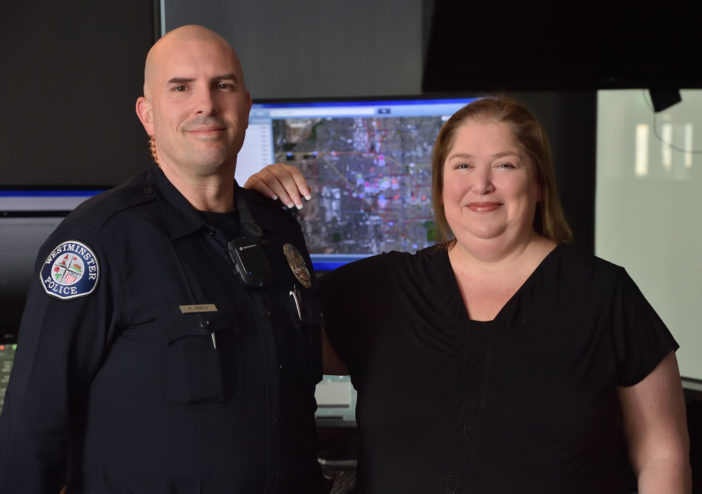Westminster Police Officer Roland Perez was about to end his patrol shift at around 5 p.m. Feb. 14 when he received the call from dispatch about a teenage girl in danger of self-harm and who was deaf.
He had to go.
“He’s the only officer we have that knows sign language,” said WPD Communications Supervisor Sonia Kelly, who was handling the call that came in via the new Text-to-911 system that rolled out Feb. 6 countywide.
This was the first time the system was used by a caller who was deaf and in a true emergency situation in Westminster. A few other text calls had come in that were pranks or accidental since the system went live, according to Kelly.

Westminster Police Dispatch Manager Sonia Kelly, left, and Officer Roland Perez talk about a call the department received using the new Text-to-911 system.
Photo by Steven Georges/Behind the Badge
Once dispatch established that the text was coming from someone who was deaf, the priority was to obtain a location. As is the case with all cell phone calls to dispatch – which accounted for about 80 percent of the calls countywide last year, according to the Orange County Sheriff’s Department – dispatchers are unable to get an exact address. And GPS locating for text calls are unreliable.
Kelly learned the girl’s address and that she needed paramedics because her shoulder was bleeding.
The girl texted, “I need to stay away from self-harm.”
When the first officer arrived at the girl’s home, Kelly was able to text her to open the door for the officer since she wouldn’t be able to hear him. The girl texted her mom and dad’s numbers to Kelly.
“Got it honey. I will call them,” responded Kelly, according to the dispatch transcript. “Your mother is en route home now.”
Perez, who is the WPD’s Homeless Liaison Officer, has known sign language all his life.
“Both my parents are deaf,” he said.
He said he actually knew the girl from a previous call and they communicated easily when he arrived.
“She was fine. She was talking to me,” he said. “She remembered from the last time I had talked to her.”
Perez said the girl’s parents, who are separated, arrived. He said the girl had a history of cutting.
“He’s just trying to work with her,” Perez said of the girl’s father.
Perez said he recommended services for the girl and set her up with an appointment with OC Mental Health.
Kelly said that because of how the texting system works –once the dispatcher ends the session, it can’t be reestablished by the dispatcher – WPD dispatchers will stay on the call as long as necessary for the safety of the caller. This particular session began at 4:40 p.m. and ended at 7:02 p.m.
“I am going to end the text session now,” Kelly texted to the girl, according to the transcript. “Please take care of yourself. During the difficult times, always remember there are people who care about you.”
Kelly said that while there are some limitations to texting – including the inability for the dispatcher to gain valuable information by hearing what is going on in the background of a voice call – it is a great tool for the hearing and speech impaired or anyone who can’t safely make a voice phone call to 911 in emergency situations.
“It’s an excellent [resource]for someone like this victim,” she said.
 Behind the Badge
Behind the Badge



